FINDING MISSING SIDE IN SIMILAR TRIANGLES
For the following figures, establish that a pair of triangles is similar, hence find x :
Example 1 :
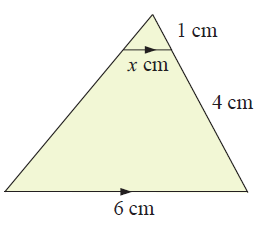
Solution :
Given, DE || BC
|
<ADE = <ABC <DAE = <BAC Using AA theorem, So, ∆ADE ~ ∆ABC |
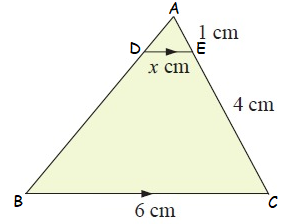 |
Then, DE/BC = AE/AC
AE = 1 cm, AC = 5 cm, DE = x cm, BC = 6 cm
x/6 = 1/5
x = 6/5
x = 1.2
So, the value of x is 1.2 cm
Example 2 :
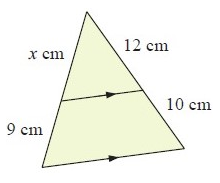
Solution :
Given, DE || BC
|
<ADE = <ABC <DAE = <BAC Using AA theorem, So, ∆ADE ~ ∆ABC So, ∆ADE ~ ∆ABC |
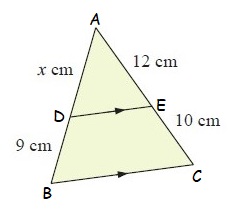 |
Then, AD/DB
= AE/EC
AD = x cm, DB = 9 cm, AE = 12 cm, EC = 10 cm
x/9 = 12/10
x/9 = 6/5
5x = 54
x = 54/5
x = 10.8
So, the value of x is 10.8 cm
Example 3 :
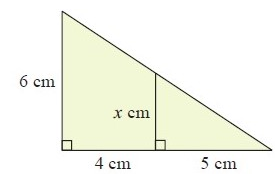
Solution :
By considering the small and larger triangles.
|
<DEC = <ABC (A) <DCE = <ACB (A) So, ∆DEC ~ ∆ABC |
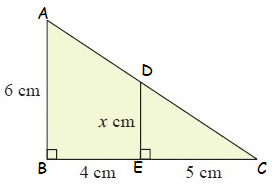 |
Then, DE/AB = EC/BC
AB = 6 cm, DE = x cm, EC = 5 cm, BC = 9 cm
x/6 = 5/9
x = 30/9
x = 10/3
x = 3 1/3
So, the value of x is 3 1/3 cm
Example 4 :
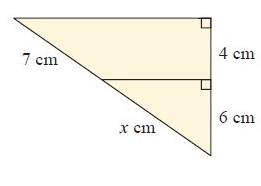
Solution :
|
<ADE = <ABC (A) <EAD = <CAB (A) So, ∆ADE ~ ∆ABC |
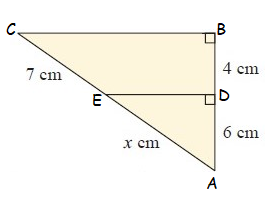 |
EA/CA = ED/BC = DA/AB
EA/CA = DA/AB
x/(7+x) = 6/(6+4)
x/(7+x) = 6/10
10x = 6(7+x)
10x = 42+6x
4x = 42
x = 42/4
x = 10.5
So, the value of x is 10.5 cm
Example 5 :
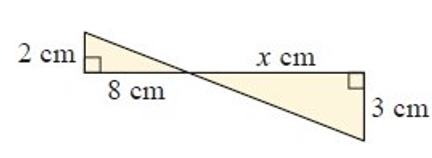
Solution :
In Δ ABC, and ΔCED
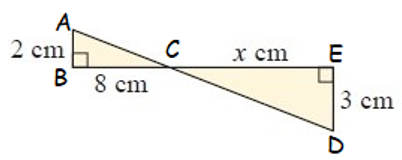
<ACB = <ECD (vertically opposite angles are equal)
<ABC = <CED (90 degree)
Using AA theorem, the above triangles Δ ABC ~ ΔCED
AB/ED = AC/CD = BC/DE
2/3 = 8/x
x = 8(3)/2
x = 12 cm
Example 6 :
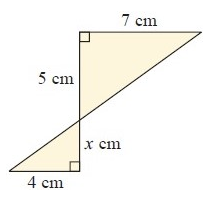
Solution :
In Δ ABC, and ΔCED
|
<DEC = <ABC (A) <DCE = <BCA (A) So, ∆DEC ~ ∆ABC |
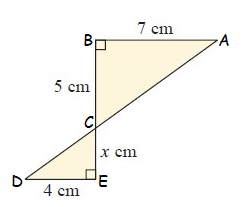 |
Then, DE/AB
= EC/BC
AB = 7 cm, BC = 5 cm, DE = 4 cm, EC = x cm
4/7 = x/5
x = 20/7
x = 2 6/7
So, the value of x is 2 6/7 cm
Example 7 :
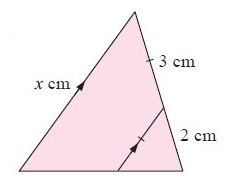
Solution :
In Δ ABC, and ΔAED
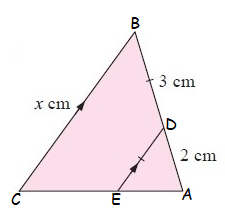
Given, DE || BC
If <ADE = <ABC
<EAD = <CAB
So, ∆ADE ~ ∆ABC
Then, DE/BC = AD/AB
AD = 2 cm, AB = 5 cm, DE = 3 cm, BC = x cm
3/x = 2/5
2x = 15
x = 15/2
x = 7.5
So, the value of x is 7.5 cm
Example 8 :
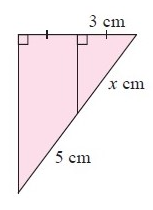
Solution :
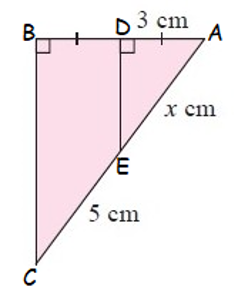
In Δ ADE, and ΔABC
<ADE = <ABC (A)
<DAE = <BAC (A)
So, ∆ADE ~ ∆ABC
AE/AC = DE/BC = DA/AB
x/(x+5) = 3/6
x/(x+5) = 1/2
2x = x+5
x = 5
So, the value of x is 5 cm
Example 9 :
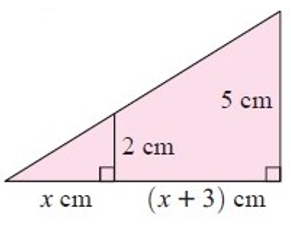
Solution :
In Δ CDE, and ΔABC
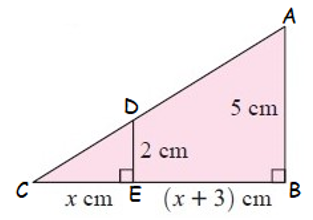
<CED = <CBA
<DCE = <ACB
So, ∆DEC ~ ∆ABC
Then, DE/AB = EC/BC
AB = 5 cm, DE = 2 cm, EC = x cm, BC = 2x+3 cm
2/5 = x/(2x+3)
5x = 2(2x+3)
5x = 4x+6
5x – 4x = 6
x = 6
So, the value of x is 6 cm.
Example 10 :
a) Find the missing angle in each triangle. How does this show that the triangles are similar?
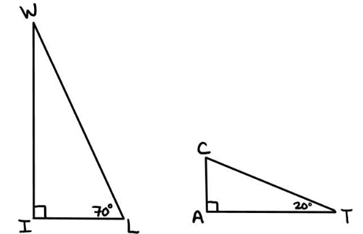
b) If 𝑾𝑰 = 𝟗.𝟒 and 𝑾𝑳 = 𝟏𝟎. Find the side 𝑰𝑳 using the Pythagorean Theorem (to one decimal)
c) If the scale factor from 𝚫𝑾𝑰𝑳 to 𝚫𝑻𝑨𝑪 is ½, find all the missing sides of triangle 𝚫𝑻𝑨𝑪.
Solution :
a)
<WIL = <CAT = 90 degree
<IWL = 180 - (90 + 70)
= 180 - 160
= 20 ----(1)
<WLI = 70
<ACT = 180 - (90 + 20)
= 180 - 110
= 70 ----(2)
<IWL = <ACT = 70 degree
Using AA the triangles WIL and CAT are similar.
By comparing the corresponding sides, we get
b)
𝑾𝑰 = 𝟗.𝟒 and 𝑾𝑳 = 𝟏𝟎
WL2 = WI2 + IL2
102 = 9.42 + IL2
100 - 88.36 = IL2
IL = √11.64
IL = 3.41
c)
WL/CT = WI/AT = IL/AC = 1/2
|
WL/CT = 1/2 10/CT = 1/2 CT = 2(10) CT = 20 |
WI/AT = 1/2 9.4/AT = 1/2 AT = 2(9.4) AT = 18.8 |
IL/AC = 1/2 3.41/AC = 1/2 AC = 3.41(2) AC = 6.82 |
Example 11 :
On a sunny day Josée’s shadow is 2.9 m long, while the shadow of a tower is 11.3 m long. If Josée is 1.8 m tall, calculate the height of the tower.
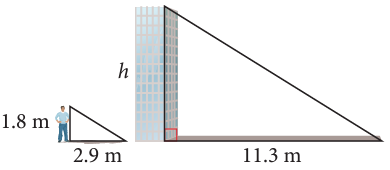
Solution :
Here h is the height of the tower. Since the triangles are similar, we compare the corresponding sides.
1.8/2.9 = h/11.3
Doing cross multiplication, we get
h = 1.8(11.3)/2.9
h = 7
So, the height of the building is 7 m.
Example 12 :
To measure the height of a tree, Cynthia has her little brother, BR, stand so that the tip of his shadow coincides with the tip of the tree’s shadow, at point C
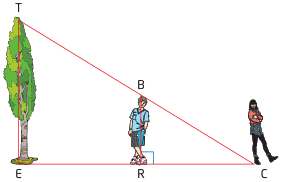
Cynthia’s brother, who is 1.2 m tall, is 4.2 m from Cynthia, who is standing at C, and 6.5 m from the base of the tree. Find the height of the tree, TE.
Solution :
Considering the triangles, TEC and BRC
BR/TE = BC/TC = RC/EC
From the picture above, BR = 1.2 m, RC = 4.2 m and ER = 6.5 m
EC = ER + RC
= 6.5 + 4.2
= 10.7 m
Here BC and TC are unknown.
1.2/TE = 4.2/10.7
4.2 TE = 1.2(10.7)
TE = 1.2(10.7)/4.2
TE = 3.05 m
So, height of the tree is 3.05 m.
Kindly mail your feedback to v4formath@gmail.com
We always appreciate your feedback.
©All rights reserved. onlinemath4all.com
Recent Articles
-
Digital SAT Math Problems and Solutions (Part - 150)
Apr 25, 25 11:46 AM
Digital SAT Math Problems and Solutions (Part - 150) -
AP Calculus AB Problems with Solutions (Part - 19)
Apr 24, 25 11:10 PM
AP Calculus AB Problems with Solutions (Part - 19) -
AP Calculus AB Problems with Solutions (Part - 18)
Apr 24, 25 11:06 PM
AP Calculus AB Problems with Solutions (Part - 18)
